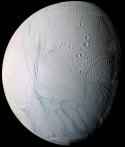
Similar to Europa, scientists believe Enceladus may contain liquid water or at least some semi-liquid form of water below its ice surface.
Enceladus' interesting processes could harbor life in one of the two classic "life begins here" theories; the primordial soup theory and the deep sea vent theory. Primordial soup is probably more familiar to most people. Having been theorized by Charles Darwin and subsequently tested and (somewhat) proven by Stanley L. Miller and Harold C. Urey, the life-goop theory has been taught in most life-science courses for the past few decades. A pool of seemingly innocuous chemicals, in reaction to some sort of catalyst, an electrical discharge is a likely culprit, spontaneously combine to create amino acids, the building blocks of life.Source: DailyTech
Enceladus' possible sub-surface water could harbor the necessary chemicals for this process to occur, along with the heat to drive chemical reactions. It does seem a little more far-fetched than Earth's life's foundation, but stranger things have been known to happen in the universe.
The deep sea vent theory seems a little more plausible for the Saturnian satellite. Various microbial and bacterial life exists on Earth which is mostly unlike much of the life we're accustomed to. These critters survive in very unique ecosystems, such as the high pressure, super-heated, random mineral filled plumes of debris spewing from deep sea hydrothermal vents, or fracture zones deep within the Earth's crust where no light, oxygen or organic input of any kind can reach them. While vent microbes feed on the various minerals in plumes, the deep earth variety have actually been shown to "eat" the radioactive decay of the rock they live in.